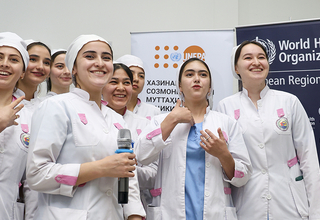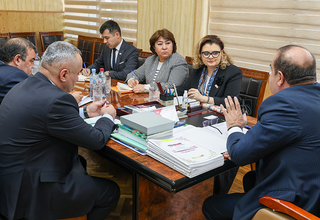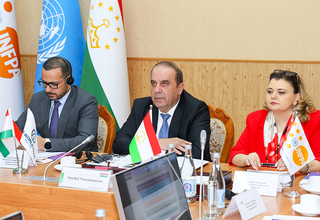You are here
UNFPA in Tajikistan
UNFPA, UNITED NATIONS POPULATION FUND
UNFPA TAJIKISTAN IS THE UNITED NATIONS SEXUAL AND REPRODUCTIVE HEALTH AGENCY.
OUR MISSION IS TO DELIVER A WORLD WHERE EVERY PREGNANCY IS WANTED,
EVERY CHILDBIRTH IS SAFE AND EVERY YOUNG PERSON’S POTENTIAL IS FULFILLED.
BECAUSE EVERYONE COUNTS!
Sexual and Reproductive Health, Family Planning and Maternal Health
UNFPA, together with a wide range of partners, works to achieve the goal of universal access to sexual and reproductive health and rights, including family planning, maternal health as well as differing needs and vulnerabilities of women and girls in emergencies by addressing the lack of access to essential reproductive health services and prevention of sexual & gender based violence in these situations.
To achieve this goal, we advocate for and provide technical assistance in revising the existing and developing new national plans and policies that prioritize universal access to sexual and reproductive health. We enhance skills of health service providers to deliver stigma-free integrated client-oriented sexual and reproductive health services, including on family planning and maternal health. UNFPA supports introduction of internationally recognized evidence based strategies and innovative programme focused on ending of preventable diseases and death including cervical cancer prevention and Beyond the Number. The Fund supports the Ministry of health and social protection of Republic of Tajikistan with capacity strengthening of health professionals to provide quality emergency obstetric care services aiming at reduction of maternal and child morbidity and mortality.
At the policy and decision making level we facilitate implementation of the total marketing approach for contraceptives and advocate for increased domestic funding for procurement of family planning commodities and further strengthen the contraceptive logistics and management system to ensure sustainable commodity security at all facility levels. We help national partners in raising capacities in emergency preparedness and response, develop or revise humanitarian contingency plans to include relevant elements of the Minimum Initial Service Package for reproductive health in crisis situations.



